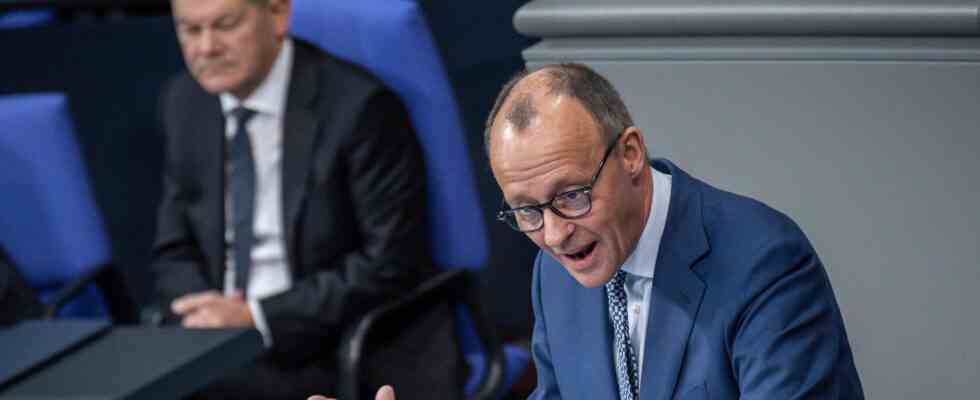analysis
Status: 11/23/2022 3:52 p.m
In the midst of the greatest crisis, the opposition and government tend to only rake in their political allotments. Also because the biggest controversies had been cleared up beforehand. The Union is apparently still looking for its role.
Anyone who still had in mind the fiery duel between opposition leader Friedrich Merz and Chancellor Olaf Scholz in September could only be disappointed this time. At least initially. Merz began his contribution to the debate in a comparatively state-oriented manner with the war crimes in Ukraine. His first critical and spontaneous dig was at the “right corner” in parliament, where the AfD parliamentary group sits. The applause he misses when he says he hopes that Putin will have to answer for these crimes at some point.
Coincidence or calculation? Merz had been criticized in his own ranks in recent months for the populist reference to AfD vocabulary, for example in his description of alleged “social tourism” among Ukrainian refugees. “Merz used the usual method of right-wing populists: first cross borders, then row back,” said Christian Bäumler, vice-chairman of the workers’ wing of the CDU (CDA), “thus he stands in his own way to the chancellor’s office and thus damages the Union .”
It’s all about the big picture again
It’s budget week in the Bundestag again – and in addition to many individual budgets of the ministries, the first item is traditionally used for an exchange of blows between the head of government and the opposition: it’s actually about the small budget of the chancellor’s office overall. But that only provides the occasion to debate the big picture.
Actually, that’s Merz’s flight level and ambition to position itself as a competent substitute chancellor in such debates. But that day he remained undecided. He once praised the chancellor for his “turning point” speech in February shortly after Putin’s illegal attack on Ukraine. Then again, he accused the chancellor of having missed the opportunity at the beginning of his term to genuinely transform the country in order to remain a competitive industrial location.
“Specialist expertise – don’t give a damn!”
“As far as humanly possible, you will not get such a chance again,” added Merz, who also accused Scholz of “gross breach of word” in financing the Bundeswehr. Despite the special loan of 100 billion euros, there are still no new procurement projects. A hearty choice of words (“Expertise – don’t give a damn!”) – but Merz himself remained pale when asked what he would do differently as shadow chancellor.
The incumbent Chancellor countered calmly, but at least with a raised voice: “First of all, we want to ensure that the Bundeswehr is equipped in such a way that it can function for decades. Scholz renewed his commitment that the traffic light would increase defense spending to two percent of economic output”. and will”.
After all, Scholz worked on Merz’ allegations very extensively and thus in Merz’s sense of the word – or on the mistakes of a federal government led by the CDU for 16 years. The Chancellor withheld the fact that the SPD co-governed for twelve years. In any case, the coalition he is leading is “a government of action”. Positions of other opposition parties such as the Left Party and AfD were not even mentioned in the chancellor’s speech.
At times, Scholz’s appearance seemed more like a justification and PR statement for his traffic light coalition, be it on the subject of Europe or local public transport. Overall, however, the impression was that the opposition and the government were only raking in their political allotments. A real exchange of blows Merz-Scholz was also difficult at this point – because the day before the government and opposition had just agreed on a compromise on the planned citizen money. And with regard to the already approved and planned reductions in energy costs for citizens, the Union had other priorities or corrections, but no fundamentally different attitude. That may have contributed to the fact that no real controversy broke out in the Bundestag that day.

